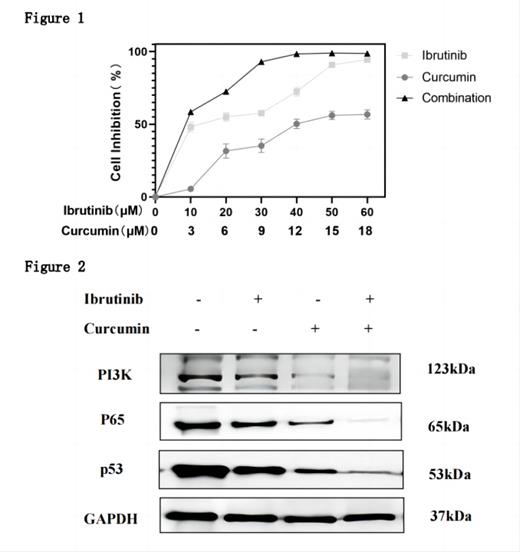Introduction
TP53 mutation and del (17p) are the most important poor prognostic factors in patients with Chronic Lymphocytic Leukemia (CLL).Patients with deletion 17p or TP53 mutations tend to have lower response rates to standard first-line chemoimmunotherapy and a more aggressive clinical course(Stilgenbauer et. al. Blood 2014). RESONATE-2 study long-term follow-up showing that ibrutinib continues to demonstrate significant and durable clinical benefit in older patients, including those with TP53 mutation(Barr et. al. Blood Adv 2022).However, CLL bearing del(17p) showed inferior OS and time to next treatment compared to non-del(17p)(Mato et. al. Haematologica 2022). A significant proportion of patients treated with single-agent ibrutinib experienced CLL progression.BTK and/or PLCG2 mutations were present in 80.0% of patients progressing with CLL, confirming prior reports on the high prevalence of these mutations in patients with ibrutinib-resistant CLL(Ahn et. al. Blood 2017). Curcumin is a bioactive natural polyphenol compound extracted from the Curcuma longa(Zingiberaceae plant). Curcumin has anti-tumor effect and can induce apoptosis and inhibit the proliferation of a series of tumor cells(Willenbacher et. al. Int J Mol Sci 2019). Curcumin may limit the development of therapy-related toxicity and reduce the financial burden of treatment.In this study, we found that Curcumin inhibits TP53-mutated CLL cells, and eliciting a strong synergistic cytotoxic effect in combination with ibrutinib.
Methods
The inhibitory effect of ibrutinib combined with curcumin on the proliferation of TP53-mutated Chronic Lymphocytic Leukemia cells was detected by CCK8, and the apoptosis of TP53-mutated CLL cells induced by ibrutinib combined with curcumin was detected by flow cytometry;The differences of gene and signal pathway expression among different treatment groups were analyzed by RNA-seq ;Using Western blot technology to verify the expression of related pathway proteins and explore the mechanism of curcumin increasing the killing effect of ibrutinib against TP53-mutated Chronic Lymphocytic Leukemia cells.
Results
The CCK8 results showed that the IC50 of ibrutinib for 24 hours was 40.61±2.35μM, while the IC50 of curcumin for 24 hours was 26.6±0.94μM. The IC50 of ibrutinib for 48 h was 14.6 ±0.8307μM, and the IC50 of curcumin for 48 h was 15.7±2.53μM.Cell inhibition of various group for 48h is shown in Figure 1.The CI of ibrutinib combined with curcumin at 24 hours and 48 hours was calculated by CompuSyn software. The results showed that the CI values of ibrutinib combined with curcumin were less than 1 at 24 h and 48 h, suggesting that ibrutinib combined with curcumin has a synergistic killing effect on CLL cells with TP53 mutation;Flow cytometry showed that the IC50 of ibrutinib for 24 hours was 67.20±2.86μM, while the IC50 of curcumin for 24 hours was 144±6.6 μM. The CI value of ibrutinib combined with curcumin was less than 1 at 24 h, suggesting that ibrutinib combined with curcumin has a synergistic promoting apoptosis on CLL cells with TP53 mutation;RNA-seq analysis and KEGG analysis of down-regulated genes of combination group compared with the control group were mainly enrich in PI3K/AKT, Cytokine-Cytokine Recptor signal pathway and so on;4.The results of Western blot showed that the protein expression levels of P65PI3K and p53 in the single drug group and the combination group were down-regulated in varying degrees, especially in the combination group(Figure 2).
Conclusion
Ibrutinib combined with curcumin has synergistic killing effect on TP53- mutated CLL cells;Curcumin increases the killing effect of ibrutinib on TP53-mutated CLL cells by inhibiting PI3K and NFκB pathway, and degrading p53mt protein.
Disclosures
No relevant conflicts of interest to declare.


This feature is available to Subscribers Only
Sign In or Create an Account Close Modal